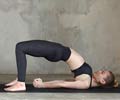According to experts, our daily life activities like climbing stairs or carrying groceries, are opportunities for short, sharp bursts of ‘High-Intensity Incidental Physical Activity’ or HIIPA.

‘The findings of the study offer practical ways to integrate physical activity in our daily life without the involvement of cost, time or special skills.’





What is a high-intensity exercise?High-intensity interval training (HIIT) includes repeated short sessions of six seconds to four minutes having 30 seconds to 4 minutes rests in between. High-intensity exercises improve fitness rapidly and also promotes cardiovascular fitness, irrespective of the number of repetition. When we regularly repeat short bursts of strenuous activity, our body gets adapted and its ability to respond better the next time we exercise strenuously.
The same thing happens in incidental physical activities. Even 20 seconds taken to climb stairs (60 steps), when done three times a day could significantly shoot up your cardiorespiratory fitness,i.e., fitness that indicates how well your lungs, heart, and other circulatory systems are working and making you less prone to develop heart diseases. Also, the intensity of exercise proves much more critical to middle-aged and old-aged people in improving health than the total duration.
How could you incorporate into your daily living?
Many people often get demotivated when they start exercising for many reasons including cost, lack of time, skills and so on. Some people find it overwhelming or unpleasant when encountered with heavy bouts of physical exertion.
Advertisement
• Replacing short car trips with walking or cycling
Advertisement
• Doing three or four ‘walking sprints’- increasing your speed until you're out of breath, during long stretches of walking
• Vigorous walking at a pace of 130-140 steps per minute
• Parking your car many feet away from the supermarket and walking back with your groceries
This type of incidental activity will help achieve the recommended 30 minutes of physical activity every day. It makes intense physical activity feel easier, helps boost fitness, even to those who are less fit.
Source-Medindia















